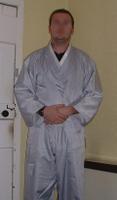A riddle
If anyone can figure out what the nonsense verse below is and how it came to be in this form, without any further clues, I'll be very impressed!
In a car he even whole of this
Chi Hollox keep Prost on for a on
Cardiff chaos in hollow logs
Some blogs have influenced the political world, some give harrowing accounts of life in a war zone, or an area hit by natural disaster, and others tell of the day to day struggle of living with a terminal disease. This one has a picture of a frog on a bike, somewhere.
If anyone can figure out what the nonsense verse below is and how it came to be in this form, without any further clues, I'll be very impressed!
In a car he even whole of this
Chi Hollox keep Prost on for a on
Cardiff chaos in hollow logs

-
He went on to talk about the lack of reflection on practice/behaviour in Christian traditions too. I'm not sure whether he meant it on a personal or corporate level or both but I was impressed by his thoughtfulness.
-
It might have been in response to the comment about being dependent, or possibly something completely unrelated, when another student said something like, ‘being an atheist, er, well, agnostic the simplicity of it appeals…’ Unfortunately, what he said was so simple that I didn’t understand it and I don’t know what simple thing it is that he finds appealing.
-
The same student also later revealed, quite naturally, that he’d read part of Plato’s Republic in Greek, possibly during his A-levels. I felt terribly ignorant and uneducated at this point.
-
The lecturer later told us that he agreed with J. A. T. Robinson about the priority of John, which is quite unusual among NT scholars. (J. A. T. Robinson tutored J. C. O’Neill on his Doctorate, J. C. O’Neill tutored Jim Bewick and Jim Bewick taught me, among many other grateful, and not so grateful, souls) You might think this is to be expected in such a class but we were translating Matthew not John and it really wasn’t a natural move at all, although it seemed quite natural at the time.
-
This weekend I went on a Crosslinks retreat. As strange as it sounds, it was my [first] real experience of spending time with Catholics. There were three or four from each Catholic, Methodist, and Anglican chaplaincies. And I'd have to say it was a good weekend without denominational boundaries.
In the interest of getting to know each other a bit, three (four) of the four (Five) in my house went out together a couple of weekends ago. I think also it was because Eva, the Chinese girl, had finished her dissertation and she and Neil (her boyfriend) wanted to celebrate. All the same, it was nice of them to invite the rest of us along.
I'm still struggling to settle in here. Due to a slight mix up on the first day, I still don't know anyone who's doing the same course as I am. I did meet someone at a quiz last week, though, who did my course last year and is doing an MPhil now. He was interesting and said even more about Mark Goodacre being brilliant. (Which seems to suggest that Birmingham without him is a bit like BBC without Jim Bewick) I saw him again on Wednesday when he was going to give me some notes but he'd forgotten them. Instead I quizzed him on various issues and he gladly educated me.
 When I was 15 this bike seemed like the height of good taste. I used to ride it into town and around the farm quite happy in the knowledge that if anyone saw me on it they'd probably be envious. But then, when I started driving, the bike was neglected and for the most part has remained in the dairy ever since. (We have a very cold room at home with a stone floor and no heating where we keep the fridge, the freezer and a load of miscellaneous old stuff with which we don't know what to do. For some reason, we call this room 'the dairy')
When I was 15 this bike seemed like the height of good taste. I used to ride it into town and around the farm quite happy in the knowledge that if anyone saw me on it they'd probably be envious. But then, when I started driving, the bike was neglected and for the most part has remained in the dairy ever since. (We have a very cold room at home with a stone floor and no heating where we keep the fridge, the freezer and a load of miscellaneous old stuff with which we don't know what to do. For some reason, we call this room 'the dairy') 